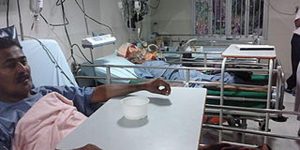
513 Fayerweather
Columbia University
Center for Science and Society
How do our conceptions of the body change? How do different experiences of a diagnostic and therapeutic intervention shift our definition of a disease? As cancer types grow increasingly diverse, so do their forms of treatment. In particular, research and clinical clinics known as “integrative centers” have become critical hubs for bringing together physicians from a range of cultural backgrounds. Trained in therapies that emerged in parts of China and India, these physicians draw from different systems of knowledge to render diseases legible. And with increasing patient demand, integrative physicians have turned their attention to developing innovative approaches to cancer treatment, recovery, and prevention.
Yet, among classical medical systems in South Asia and East Asia, “cancer” as a disease category did not exist. Can defining a disease based on its absence offer innovative forms of diagnosis and treatment? This event features a conversation between Dr. Narendra Bhatt, an integrative oncologist specializing in Ayurveda in India, and Dr. Ting Bao, an integrative oncologist specializing in Chinese medicine at the Memorial Sloan Kettering Cancer Center. As our speakers share their insights, we will learn about how they navigate among systems of knowledge. This event is both cross-cultural and cross-disciplinary, moderated by physician and scholar Dr. Rishi Goyal, and historian of medicine Lan Li.
Speakers:
Narendra S. Bhatt, M. D. Ayu., B. Sc. is a physician, researcher, and educator specializing in Ayurveda. Dr. Bhatt has served on the Governing Council and Scientific Advisory Committee of the Central Council of Research in Ayurveda, and was member of the Ayurvedic Pharmacopoeia Committee (both under Ministry of Health, now Ministry of AYUSH), Government of India. He was also associated with the Indian Institute of Integrative Medicine, Council of Scientific & Industrial Research and Department of Biotechnology under Government of India. Dr. Bhatt has represented Ayurveda and the Indian government for several international delegations, including a World Bank initiative on Indigenous Knowledge for Health under Global Research Alliance. He has published over 65 scientific papers, several scholarly articles, contributed four chapters to books related to Ayurvedic Research and has jointly held patents. Dr. Bhatt currently serves as Honorary Research Director and Adjunct Professor at BVDU College of Ayurveda, Pune and is National Professor and Visiting Scientist at the Haffkine Research Institute, Mumbai. He has served on the Faculty and Board of Studies of Ayurveda at University of Bombay and continues to be a referee examiner to the post-graduate Ayurvedic and Pharmaceutical Courses of other Universities. Dr. Narendra Bhatt is keenly interested in integrative research. At present, he is involved with blood and liver disorders including search for solutions in cancer care with Ayurveda. He currently is the president of the Indian Association for the Study of Traditional Asian Medicine.
Ting Bao, MD, of Memorial Sloan Kettering, is an integrative medicine specialist and medical oncologist, with a special focus on patients with breast cancer. In her clinical practice and research, Dr. Bao works to develop and deliver state-of-the-art evidence-based integrative oncology care to enhance and potentially extend survival for cancer patients. Born and raised in Beijing, China, Bao received her medical education at Johns Hopkins School of Medicine, with residency at John Hopkins Bayview Medical Center and fellowship at the Kimmel Comprehensive Cancer Center. Her Masters of Science in clinical research is from the University of Maryland. Prior to her position at Memorial Sloan Kettering, she was a joint faculty member at the University of Maryland Greenebaum Cancer Center and Center for Integrative Medicine. She is boardcertified in medical oncology, internal medicine and acupuncture and a Diplomat of the American Board of Medical Acupuncture. Dr. Bao developed interests in acupuncture and breast cancer research during her medical education. Principal investigator and author of a number of clinical trials, her research focuses on the efficacy and mechanisms of complementary therapies in oncology practice, including acupuncture. Recent research projects have included acupuncture to alleviate aromatase inhibitor induced musculoskeletal symptoms and acupuncture to reduce chemotherapy induced peripheral neuropathy in multiple myeloma patients. Dr. Bao serves as author and reviewer for professional journals, she serves on the NCI Physician Data Query Complement and Alternative Medicine Editorial Board.
Moderator: Rishi Goyal, MD, PhD is a doctor and scholar. Dr. Goyal earned his PhD in English and his Emergency Medicine residency as Chief Resident from Columbia University in 2010. He then took a job as Assistant Professor of Emergency Medicine and English Literature at the University of Arizona. While in Tucson, Dr. Goyal taught a class on representations of illness, while working in the Emergency room teaching residents. He was also Director of Medical Humanism for the college of medicine and developed a required third year clerkship on critical thinking in medicine. Dr. Goyal recently returned to Columbia where he is an Assistant Professor in the Division of Emergency Medicine and is teaching a class in the Institute of Comparative Literature entitled “Imagining Illness”. Dr. Goyal is broadly interested in the intersection of medicine and culture and is more specifically interested in the areas of medical cognition and identity and representation after illness.
Chair: Lan A. Li, Ph.D. ’10 is a Presidential Scholar in Society and Neuroscience at Columbia University. Trained as a historian and filmmaker, Li received her PhD in Science Technology and Society Studies at MIT. There, she explored a comparative history of body mapping among practitioners in China and Britain throughout the 20th century. Lan is particularly interested in how representations of peripheral sensation through hand-drawn maps cohered and conflicted with different understandings of health and disease. As a documentary filmmaker, Lan has also collaborated with integrative practitioners in India, Brazil, and China. She seeks to expand these collaborations across disciplinary and geographic boundaries. Lan is an alumna of the Paul and Daisy Soros Fellowship for New Americans, and as a new Scholar in the Presidential Scholars in Society and Neuroscience program, will take on a comparative history of numbness.







